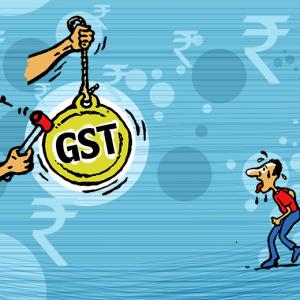There will be a dramatic alteration in the role the Centre and the states will play to shape India’s fiscal and economic destiny, report Nitin Sethi and Ishan Bakshi.
Illustration: Dominic Xavier/Rediff.com.

Over the course of the last few years, the Narendra Modi government has altered the federal architecture of the country.
The government initiated this change in 2015 by accepting the recommendations of the 14th Finance Commission, which increased the states’ share in Union taxes by 10 per cent.
The proposed roll-out of the goods and services tax from July 1 is another pivotal step in that direction.
Taken together, these two changes will dramatically alter the role the Centre and the states will play to shape India’s fiscal and economic destiny.
The GST Council is India’s first truly federal council with fiscal powers vested in it.
Perhaps the only other institutional mechanism where the Centre and the states formally sat together was the Inter-State Council. But the GST Council has a wider fiscal remit.
Unlike earlier, when the Centre had the sole licence to tax goods and services, the GST Council, which includes representation from all states, will exercise authority over all indirect taxation, except customs.
Its remit includes deciding tax rates for different goods and services, exemptions, exclusions or inclusions of items in the new tax.
“The real issue is the change in the right of taxation,” said Pronab Sen, former chief statistician of the government.
“Earlier, the Centre taxed production of goods and services, and incomes (both personal and corporate), while states taxed sales. Now, the Centre as well as the states will have the authority to tax both production of goods and services, as well as sales. There is a widening of the ambit for both the Centre and the states,” he explained.
Yet, despite the federal nature of the council, the Centre will hold a veto over all decisions.
In the GST Council, the Centre will have a third of the voting rights, with the balance two-thirds equally shared among the states.
But, for any proposal to be cleared by the council, it will require 75 per cent of the vote. This effectively gives the Centre a veto, though it would require 19 of the 30 states to agree with its proposals to sail through.
This greater say in imposing taxes should be seen in conjunction with the leverage states have gained with the Centre accepting the recommendations of the 14th Finance Commission.
The 14th Finance Commission increased the states’ share in the divisible tax pool from 32 per cent to 42 per cent. This increase in untied funding has given states greater flexibility to prioritise their expenditure.
As some research reports have shown, different states have used this flexibility differently. While some have used this increase to fund greater capital expenditure, others have expanded particularly in the social sector.










